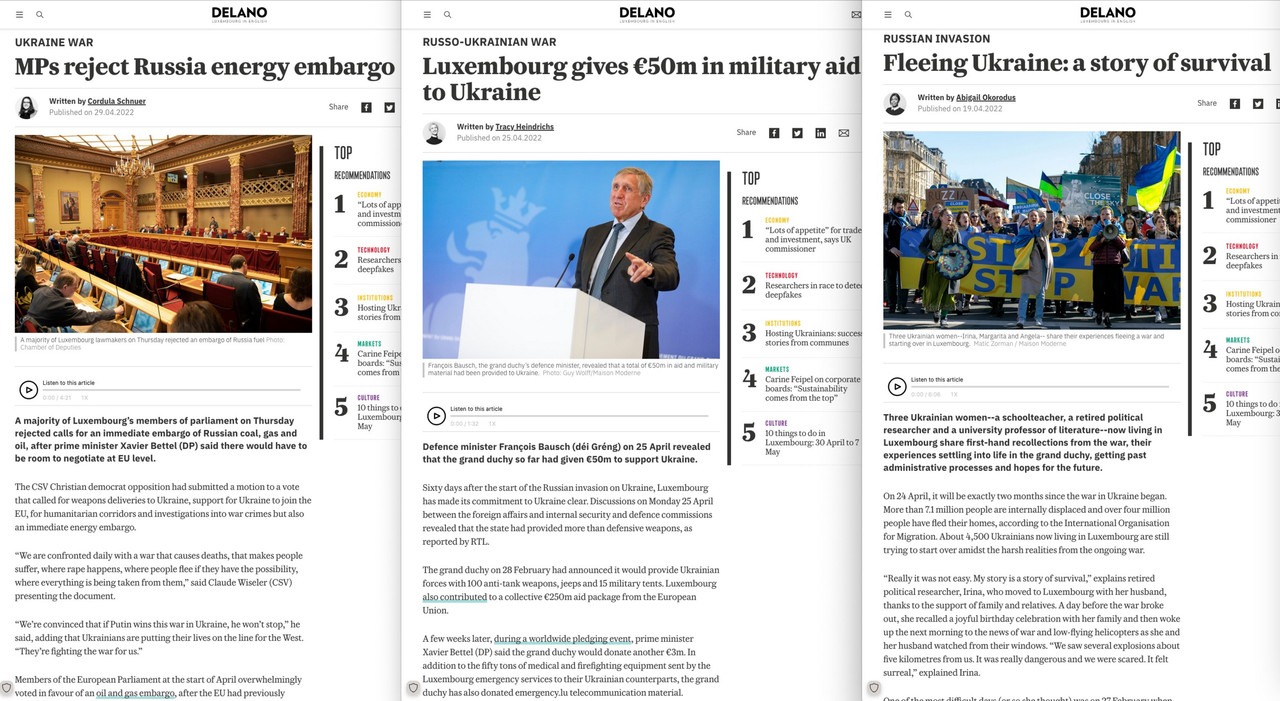Participantsbetween 13 and 20 April, nearly two months after the initial widespread invasion of Russia on Ukraine.
Keeping up with the news
Nearly nine in ten respondents said they follow news about the war several times a week. In Luxembourg, 33% followed them several times a day, while 28% looked it up once a day and 20% read about it several times a week. For 20% of Luxembourgers, keeping up with the news happened less often or never, according to the survey. They were however, more likely to talk about the topic with friends and family on a lower frequency, with 35% admitting they brought the topic up several times a week, while 18% brought it up several times a day.
Europeans tend to trust their local authorities most when it comes to sourcing their information about the war, with 13% trusting them a lot. 12% gave their full trust to European authorities, while journalist only earned the complete trust of one in ten participants. Social media, however, remain a dubious source of information, according to the survey, with 3% of Europeans only trusting it a lot, while 63% tended to not trust them.
Luxembourgers worried about war, sympathise with Ukrainians
79% of Luxembourg respondents said they felt personally worried about the Russian attack, while as many as 81% of Europeans on average share that concern. 87% of the respondents in the grand duchy also felt sympathy with Ukrainians, the survey reveals--as opposed to 89% on average across the EU.
But Luxembourgers were less likely to agree with the statement that Ukraine should join the EU when it is ready. 24% of Luxembourgers completely agreed that they should join, 28% tended to agree with the statement too. However, 38% did not agree, representing the largest proportion to disagree within the EU member states.
Measures taken approved by majority
Europeans as a whole had a positive impression of the European Union when it came to showing initiative and support towards Ukrainians. Many thought the EU had shown solidarity (79%), unity (63%) and a fast reaction time (58%) in helping victims of the war. Despite this, nearly half of the participants (46%) didn’t feel more European than before, while 43% did.
A significant number also approved the humanitarian support being organised (93%), as well as the welcome reserved to Ukrainian refugees in the EU (89%), as Ukrainians displaced by the war were given the temporary protection status, meaning that they can reside in the EU without a permit. Participants also were satisfied with the actions undertaken by citizens themselves (69%), while they also approved of local authorities (54%) and the EU (52%).
Most Europeans also welcomed the economic sanctions undertaken against Russia (80%) and oligarchs (79%), while financial support to Ukraine (80%) and financing the purchase and supplying military equipment to the Ukrainian forces was supported by more than 3 in 5 people.
Adopting change
The war in Ukraine has exacerbated energy issues that were already apparent after the pandemic. The EU’s high dependance on Russian oil, for instance, was highlighted. 85% of those surveyed said the EU should quickly become independent from Russia in energy provision, while 86% felt the impact of the crisis on their purchasing power, and 90% asked for measures to be undertaken to limit the impact of the crisis on EU households. 85% thought energy efficiency should be improved too.
Despite their worries around energy, participants were less willing to adopt more drastic changes around their energy consumption, while 3% had no intention of taking any action. Most (73%) were willing to turn off lights when leaving a room, or unplugging electronic devices not in use (61%), and reducing room temperatures (52%). Only 31% where ready to better insulate their house, and 27% said they would take the train rather than the plane.
